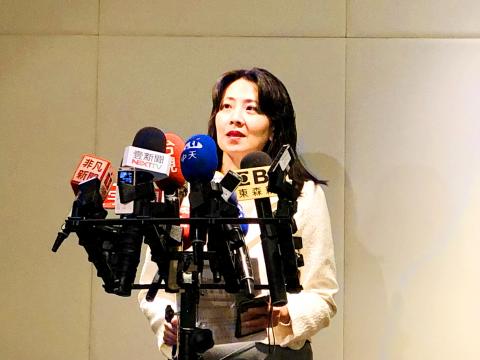The Ministry of Foreign Affairs yesterday protested after China forced the organizers of the International Conference on Computer Vision (ICCV) in South Korea to change Taiwan’s status from a “nation” to a “region” in a set of slides.
At the opening of the conference, which took place at the COEX Convention and Exhibition Center in Seoul from Tuesday to yesterday, the organizers released a set of introductory slides containing graphics showing the numbers of publications or attendees per nation, including Taiwan.
However, the titles on the slides were later changed to “per country/region,” because of a complaint filed by a Chinese participant.

Photo: Lu Yi-hsuen, Taipei Times
“Taiwan is wrongly listed as a country. I think this may be because the person making this chart is not familiar with the history of Taiwan,” the Chinese participant wrote in a letter titled “A mistake at the opening ceremony of ICCV 2019,” which was published on Chinese social media under the name Cen Feng (岑峰), who is a cofounder of leiphone.com.
The ministry yesterday said that China’s behavior was contemptible and it would not change the fact that Taiwan does not belong to China.
Beijing using political pressure to intervene in an academic event shows its dictatorial nature and that to China, politics outweigh everything else, ministry spokeswoman Joanne Ou (歐江安) said in a statement.
The ministry has instructed its New York office to express its concern to the headquarters of the Institute of Electrical and Electronics Engineers, which cosponsored the conference, asking it not to cave in to Chinese pressure and improperly list Taiwan as part of China’s territory, she said.
Beijing has to forcefully tout its “one China” principle in the global community because it is already generally accepted that Taiwan is not part of China, she added.
As China attempts to force other nations to accept its “one China” principle and sabotage academic freedom, Taiwan hopes that nations that share its freedoms and democratic values can work together to curb Beijing’s aggression, she added.

‘WIN-WIN’: The Philippines, and central and eastern European countries are important potential drone cooperation partners, Minister of Foreign Affairs Lin Chia-lung said Minister of Foreign Affairs Lin Chia-lung (林佳龍) in an interview published yesterday confirmed that there are joint ventures between Taiwan and Poland in the drone industry. Lin made the remark in an exclusive interview with the Chinese-language Liberty Times (the Taipei Times’ sister paper). The government-backed Taiwan Excellence Drone International Business Opportunities Alliance and the Polish Chamber of Unmanned Systems on Wednesday last week signed a memorandum of understanding in Poland to develop a “non-China” supply chain for drones and work together on key technologies. Asked if Taiwan prioritized Poland among central and eastern European countries in drone collaboration, Lin

The Chien Feng IV (勁蜂, Mighty Hornet) loitering munition is on track to enter flight tests next month in connection with potential adoption by Taiwanese and US armed forces, a government source said yesterday. The kamikaze drone, which boasts a range of 1,000km, debuted at the Taipei Aerospace and Defense Technology Exhibition in September, the official said on condition of anonymity. The Chungshan Institute of Science and Technology and US-based Kratos Defense jointly developed the platform by leveraging the engine and airframe of the latter’s MQM-178 Firejet target drone, they said. The uncrewed aerial vehicle is designed to utilize an artificial intelligence computer

Renewed border fighting between Thailand and Cambodia showed no signs of abating yesterday, leaving hundreds of thousands of displaced people in both countries living in strained conditions as more flooded into temporary shelters. Reporters on the Thai side of the border heard sounds of outgoing, indirect fire yesterday. About 400,000 people have been evacuated from affected areas in Thailand and about 700 schools closed while fighting was ongoing in four border provinces, said Thai Rear Admiral Surasant Kongsiri, a spokesman for the military. Cambodia evacuated more than 127,000 villagers and closed hundreds of schools, the Thai Ministry of Defense said. Thailand’s military announced that

CABINET APPROVAL: People seeking assisted reproduction must be assessed to determine whether they would be adequate parents, the planned changes say Proposed amendments to the Assisted Reproduction Act (人工生殖法) advanced yesterday by the Executive Yuan would grant married lesbian couples and single women access to legal assisted reproductive services. The proposed revisions are “based on the fundamental principle of respecting women’s reproductive autonomy,” Cabinet spokesperson Michelle Lee (李慧芝) quoted Vice Premier Cheng Li-chiun (鄭麗君), who presided over a Cabinet meeting earlier yesterday, as saying at the briefing. The draft amendment would be submitted to the legislature for review. The Ministry of Health and Welfare, which proposed the amendments, said that experts on children’s rights, gender equality, law and medicine attended cross-disciplinary meetings, adding that